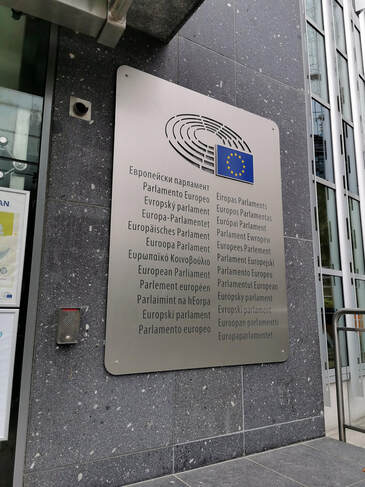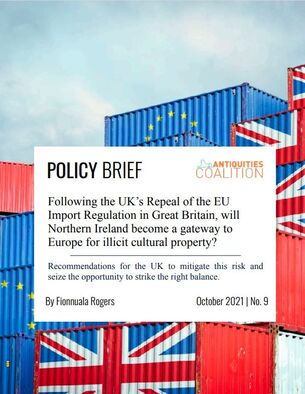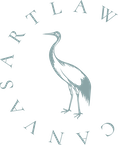|
24/5/2021 PRESS RELEASE: UK Blue Shield concerned UK unprepared to prevent UK becoming a gateway for looted objectsRead Now Blue Shield UK (BSUK) expresses concern that the UK government is unprepared to handle the challenges of maintaining distinct systems for the import of cultural goods into different parts of the UK and has significantly underestimated the risks this might pose to the increase of illicit trafficking through Northern Ireland. On 19th May 2021, the UK began to repeal the EU Regulation on the Import of Cultural Goods (EU 2019/880) (the “Regulation”) in Great Britain, but not Northern Ireland. The Regulation seeks to combat illicit trafficking, terrorist financing, and to protect cultural heritage. Despite agreeing with the objective, the UK Government is expected to pass the revocation quickly, as it considers it legally defective post-Brexit. The Regulation has been widely criticised for its potential effects on what many countries may recognise as legally owned objects which have no contribution to terrorist financing. However, its repeal in Great Britain but not Northern Ireland could create major challenges if the UK is not well prepared.
The Memorandum accompanying the revocation legislation suggests existing domestic laws are sufficient to prevent illicit trafficking but in reality, they are not actively enforced in the UK and do not require active checks of imported cultural goods. Furthermore, not all legislation applies equally across the UK [1], a fact which is notably absent from the Memorandum. As a result, by trying to reduce the requirements imposed by the Regulation, UK customs authorities will have to understand and operate three different sets of rules and laws to ensure no illicit cultural objects enter UK borders, depending on the point of entry. Professor Peter Stone, President of Blue Shield International, states: “The UK’s “do nothing” approach to the Regulation is a nod to the rest of the world that Great Britain is the destination for objects that do not meet the strict standards of the Regulation implemented across the EU, effectively reneging on its international commitments to tackle illicit trafficking. Culture is considered a key component of soft power and a significant part of the UK international agenda, so it is extremely disappointing that although the UK is required to enact measures to prevent illicit imports, it has chosen not to do so.” The EU adopted the Regulation in April 2019, with the aim of combatting trafficking, terrorism financing and to protect cultural heritage by preventing the import of cultural goods illicitly exported from their country of origin into the EU. Only part of the Regulation entered into force before the end of the Brexit transition period – Article 3(1), which prohibits the import of illegally exported cultural goods into the UK (and EU Member States), and which is considered retained EU law [2]. Alexander Herman, Assistant Director of the Institute of Art & Law, comments “The EU Regulation’s Article 3(1) prohibition on introducing cultural goods presents a significant expansion of the usual import restrictions for this sort of material. By repealing it, the UK may be seen to be facilitating the illicit trade, even if that is not its intention. Rather than a ‘quiet repeal’, the UK should instead come out and demonstrate its commitment to fighting illicit trade by ensuring that its existing national legislation is properly implemented and enforced at the border. Only through such actions will the UK be able to ensure that its art and antiquities market remains legitimate going forward.” The Regulation also sets out a licensing system, due to come into force in the EU in 2025, which the UK has always stated it would not adopt. However, the finalised Northern Ireland Protocol (Annex 2) (Dec 2020) declares Northern Ireland will adopt the full Regulation and the licensing system along with the EU. The Memorandum states that there will be “some impact on the movement of cultural goods into Northern Ireland” but gives no detail on how imports will be handled, nor the measures to prevent Northern Ireland being targeted as a gateway for cultural goods into the EU. Despite some acknowledgement of the impact, the Government maintains it will not change the way it imports cultural goods, relying instead on intelligence. However, this is extremely problematic: to adequately implement Article 3(1) (and ultimately the Regulation) in full, many changes will be required, and it is imperative that these measures are fully considered during the upcoming parliamentary debate. Cultural property lawyer and Chair of BSUK, Fionnuala Rogers, states: “It is highly likely that the EU will want to ensure that Northern Ireland does not become a gateway for cultural goods to enter the EU in violation of the Regulation. Equivalent checks will need to be carried out in Great Britain, and UK customs will need to ensure that cultural goods being exported to Northern Ireland, whether destined for the EU or not, have not been illegally exported from their country of origin, a check that is not currently required at UK borders. Ultimately, the UK is going to have to make some significant changes as a result of this Regulation, despite the revocation.” Once the EU licensing system is operational, UK authorities will need to issue licences on behalf of Northern Ireland and will almost certainly need some form of access to the EU database. Actively keeping the Regulation in Northern Ireland could also contribute to the offences the Regulation is designed to counter– potentially allowing goods with questionable legitimacy into the EU, effectively through a back door. The Revocation is the first step in what will become a significant separation between Great Britain’s approach to cultural goods and that of the EU and Northern Ireland. BSUK expresses its sincere concern that UK Government has not adequately considered how it will ensure adequate support, training, expertise and funding for Northern Ireland to comply with its obligations under the Regulation, or how it intends to harmonise the disjointed UK legislation in order to ensure the UK is will not become a gateway for illicitly trafficked objects. It is essential that the UK Government considers these matters during the parliamentary debate. Further, in recognition of UNESCO’s commitment to raise awareness of how to build an ethical art trade and in celebration of the 50th Anniversary of the Convention on the Means of Prohibiting and Preventing the Illicit Import, Export and Transfer of Ownership of Cultural Property 1970 (signed by the UK in 2001), BSUK also calls for a UK-wide working group to discuss how to mitigate the risks created by the inconsistent legal systems, and to support those tasked with implementing them. [1] The Dealing in Cultural Objects Offences Act 2003 does not extend to Scotland.
[2] For interpretation of “retained EU law” see section 6 of the EU (Withdrawal) Agreement Act 2018. 21/2/2021 LIVE PANEL: Following Brexit, will the UK become a centre of cultural racketeering?Read Now Will the UK become a gateway to Europe for illicit cultural property?On March 1, 2022 at 12:00 PM New York / 5:00 PM London, join the Antiquities Coalition for an engaging discussion with Think Tank Policy Brief author Fionnuala Rogers, Chair of UKBS, and an expert panel on the impact of the UK’s decision to repeal the EU Import Regulation in Great Britain, and recommendations for next steps. What was the UK’s reasoning behind the decision to repeal the regulation (and failure to replace it)?Will this repeal create a gateway to Europe for illicit cultural property through Northern Ireland, where the regulation still applies? And, how can the UK take advantage of this unique opportunity to adopt bespoke practices that fight cultural racketeering? Meet the speakersSophie V. Hayes Sophie Hayes has been a Detective Constable in the Metropolitan Police’s Art and Antiques Unit since 2016. She recently completed an MA in Cultural Heritage Studies at University College London. Alexander Herman Alexander Herman is Director of the Institute of Art and Law and co-directs the Art, Business and Law LLM developed with Queen Mary University of London. His new book ‘Restitution – The Return of Cultural Artefacts’ is out now. Tova Ossad Tova Ossad is the founder of Ossad Art Management, a bespoke registrar consultancy that is focused on the import and export of art in the United Kingdom, European and the United States as well as the application and administration of Temporary Admission accounts, British and European customs procedures, adjusting to the United Kingdom’s exit from the European Union, advice on storage solutions, and collections management. Fionnuala Rogers Founder and Director of Canvas Art Law and Chair of U.K. Committee of the Blue Shield, Ms. Rogers has been working in art law for 10 years, with a particular interest in cultural property and extensive experience in art and heritage in the Middle East, where she regularly works. She is the author of the AC Think Tank Policy Brief “Following the UK’s Repeal of the EU Import Regulation in Great Britain, will Northern Ireland become a gateway to Europe for illicit cultural property? Recommendations for the UK to mitigate this risk and seize the opportunity to strike the right balance.” Fionnuala Rogers worked with the major NGO Think Tank, The Antiquities Coalition, to release of a Policy Brief that analyses the UK’s decision to Repeal the EU Import Regulation in Great Britain and prevent the resulting risk of Northern Ireland becoming a gateway to Europe for illicit cultural property. Rogers argues that the repeal creates a gateway to Europe for illicit cultural property through Northern Ireland, where the regulation still applies, and that the UK must take immediate steps to mitigate that risk. read the briefThis paper makes a series of recommendations to encourage the UK to rationalize its regulatory approach, meet its international commitments, and to set a leading example for other art market countries in cultural heritage protection.
The paper follows extensive lobbying by the UK Committee of the Blue Shield, including an earlier Press Release highlighting the issue and a Memorandum circulated to UK Government. The House of Lords cited UK Blue Shield and our Memorandum, and called the Government paper “misleading” when we challenged the Government’s approach to N. Ireland in its repeal of EU Reg 2019/880 on the Introduction and Import of Cultural Goods (Hansard Debate).
13/6/2018 UK Blue Shield Position Paper on UK Adoption of the EU Regulation on the Import of Cultural GoodsRead Now On 13 July 2017, the European Commission proposed new rules to stop imports in the European Union of cultural goods illicitly exported from their country of origin – the EU Regulation on the Import of Cultural Goods. A vote is scheduled on the 10 July 2018, and – if successful – the new regulations are expected to apply across all EU Member States from 01 January 2019. UK Blue Shield recognises that the Proposed Regulations have an important and necessary objective: to prevent the import and storage in the EU of cultural goods illicitly exported from a third country, thereby reducing trafficking in cultural goods, combatting terrorism financing and protecting cultural heritage, especially archaeological objects in source countries affected by armed conflict. However, we have a number of concerns, which we express in this position paper
There are three major flaws: the inadequacy of using the 1970 UNESCO Convention; the difficulties in establishing a source country; and the difficulty identifying items in the different Categories of cultural goods. We also express a number of additional concerns which we do not consider to be fundamental but should be considered. If not addressed, we are concerned that the proposed Regulations may be insufficient to achieve their intended goals. UKBS urges the UK Government address the concerns posed here in order to work towards comprehensive, pragmatic legislation. UKBS has also released two other papers concerning UK implementation of the 1954 Hague Convention for the Protection of Cultural Property in the Event of Armed Conflict (ratified December 2017), and the s.17 Offence.
|
Details
Categories
All
Archives
November 2021
|
||||||||||||||||



